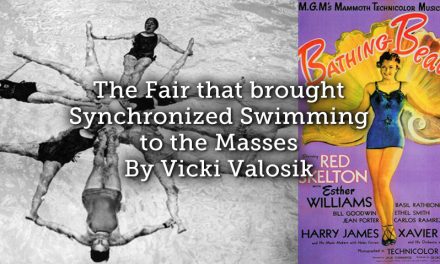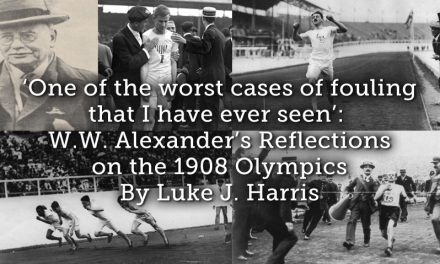Between 1964 and 1976, Klaus Dibiasi was one of the greatest divers in the World. Klaus always recognized the fundamental help given by his father and coach, Karl, in achieving his triumphs and in 2006, the Swimming Hall of Fame inducted Karl Dibiasi to its ranks. Karl’s diving career was very respectable and at least in one area, career longevity, phenomenal like that of his son. Karl debuted in the national field in 1931 and 31 years later he placed third in the Italian Diving Championships on the platform, at the age of 53; an impressive achievement, even in comparison to today’s era, more open to longer careers.
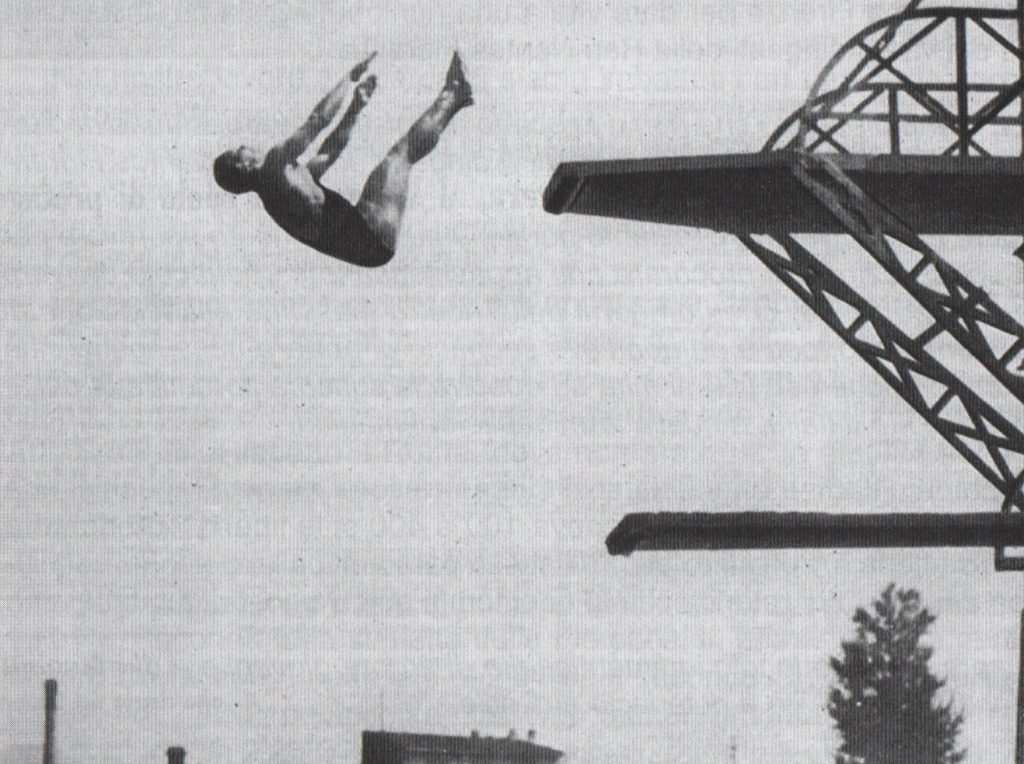
Karl diving from platform during 1933 Italian championships held in Florence
Karl Dibiasi, born in Cornedo/Korneid near Bolzano/Bozen on 19 October 1909, was intimately connected to the profound changes of his land, South Tyrol, in the early twentieth century. Initially a citizen of the Austro-Hungarian Empire, in 1918 he became an Italian citizen, in 1939 German by choice, in 1945, at the end of World War II, Austrian, and, from 1953 to his death, in 1984, Italian again by choice. Within the great historical changes of this period, Karl chose a life that made the best use of his talents and which met the needs of his family.
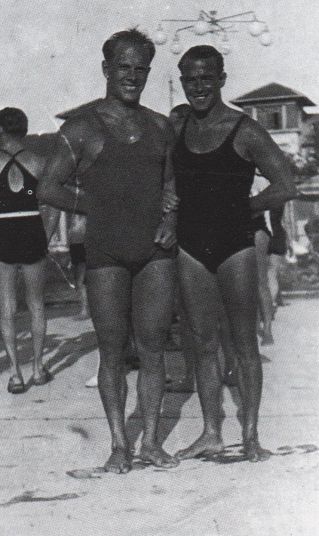
Karl (on the left) with Otto Casteiner, another important diver from the Bozen area
As son of a bank official, also named Karl, and Anna Matha, Karl grew up in an environment open to sport. After finishing his military service for the Italian state in 1931, he found a good job as a bank clerk in Bozen and dedicated himself to diving, although he immediately encountered great difficulties with training and in finding up-to-date facilities. This did not prevent him from a rapid rise to the Italian diving elite. In 1933, in Florence, he won the Italian second class springboard (1 and 3 meters) and platform (5 and 10 meters) titles. With these victories, he gained entry to the top-class competition and also won the platform title (10 meters) – which became his specialty – repeating the success in 1934, 1936 and 1939. During his first Italian period, Karl participated at the European Championships held in Magdeburg in 1934 and at the 1936 Olympics in Berlin, ranking eighth and tenth respectively. For two years, Karl joined the university club of Turin, but still could not train adequately and he was forced to travel long distances to Bologna or Milan to practice.
1939 was a crucial year in Karl’s life. Unfortunately, his father died on 6 February. On 12 July he married Hildegard Bauer. During the year, the Italian fascist government and Nazi Germany signed an agreement intended to resolve the question of the German minority in South Tyrol, who had been repressed and deprived of basic rights by the fascist regime. The treaty allowed for the South Tyrolian German minority to move to the enlarged German state, which had incorporated Austria (then called Ostmark), and to receive citizenship, accommodation and a job. Being a sport champion, Karl found a position as a pool manager in the town of Solbad Hall in Tyrol and joined the swimming club of nearby Innsbruck. This arrangement, at least, resolved Karl’s training problems. He was enlisted in the German army, but at the same time found a way to compete in diving, winning the Ostmark title in 1941, and ranked fourth in the German Championship of 1942.
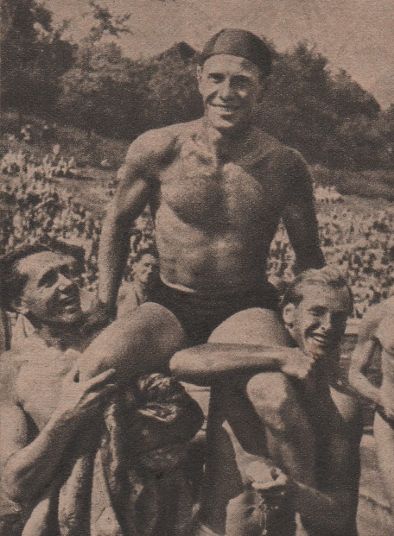
Karl is carried in triumph in Solbad Hall after his victory in the 1947 Austrian championships
Image by Wiensport
Karl was mobilized to the African campaign on 30 March 1943, as part of the last contingent called before the German defeat. The American troops captured Karl and segregated him for two years in Fort Leonard Wood in Missouri state, USA. He finally left on 26 July 1946. In the restored Austria after the war, Karl re-started his sporting activity and increasingly dedicated himself to training as he had done since his years in Italy. In 1949, he obtained the top qualification as a competition diving judge by the Ministry of Education. Meanwhile, the family had expanded, after Christl, born in 1943, Klaus (1947) came into the world. Another son, Heinz, would be born in 1951.
Given that Karl had remained in Austria after the war, he needed to fulfil the requirements for the citizenships, as his wife Hildegard had done in 1949, but he hesitated. Citizenship problems meant that in 1947, Karl was prohibited from competing for Austria in the European Championships in Monte Carlo, despite victory in the Austrian Championships at Solbad Hall. A year later, in 1948, he was able to compete for Austria in international competitions, including against Italy. However, during this period, Karl felt a growing nostalgia for his homeland, coupled with a dissatisfaction for his role within the Austrian national team’s college of coaches directed by the German Erhard Weiss. Karl believed he had the skills to play a major role in training strategy and decision-making and there were numerous divers who had spent a period of time at Solbad Hall under Karl’s guidance. After a third-place finish in the 1950 Austrian Championships, which led to Karl being not selected for the European Championships in Vienna, in March 1951, Karl signed a document that officially stopped the process for him to reacquire Austrian citizenship.
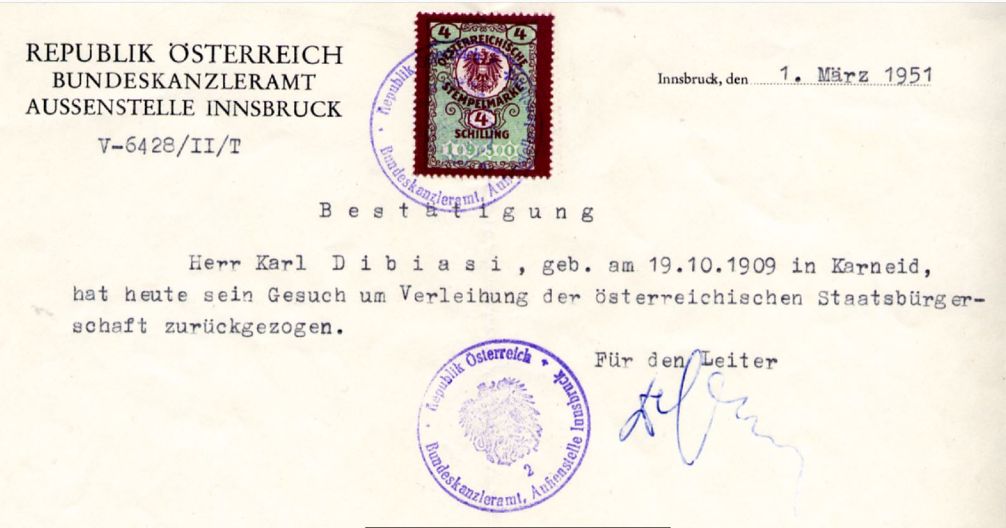
In completing this document, Karl relinquished Austrian citizenship
In 1952, Dibiasi won his sixth and last Tyrolean title and thanks to guarantees supplied by his father-in-law, Karl Bauer, he returned to Bozen in the spring of 1953, and obtained a job at the Cassa di Risparmio bank. The process to obtain Italian citizenship was relatively simple and in the same year, Karl placed third in the Italian Championships. Gradually, he became the technical lead for diving at the pool in Bozen as part of the local swimming association, which under his management became a leader in Italy and, thanks to Klaus and Franco Cagnotto, in the World. Free to fully implement his technical and strategic project, he became a recognized master of technique and known for his affable nature. In 1956, he finished second in the Italian Indoor Championships and in 1970 he supported with the constitution of the autonomous Federation for South Tyrolean sport which was established within the Italian sports framework to manage sporting activity in the historically troubled region of South Tyrol.
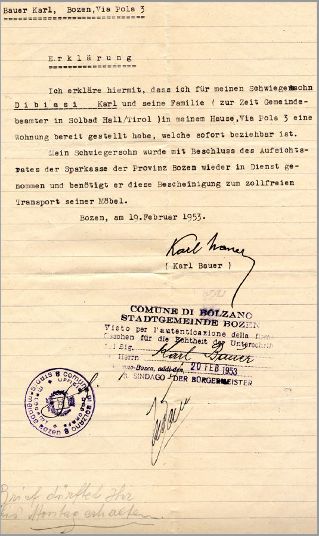
By signing this document, Karl Bauer guaranteed that his son-in-law could return to Bozen
Karl’s ambitions to create a successful school came true. His son Klaus became a hero for Italy and not for Austria. After the troubles, Karl lived with his family in his beloved country. The decisions of high politics change the course of history, but sometimes the individual choices can change some effects that seem apparently obvious.
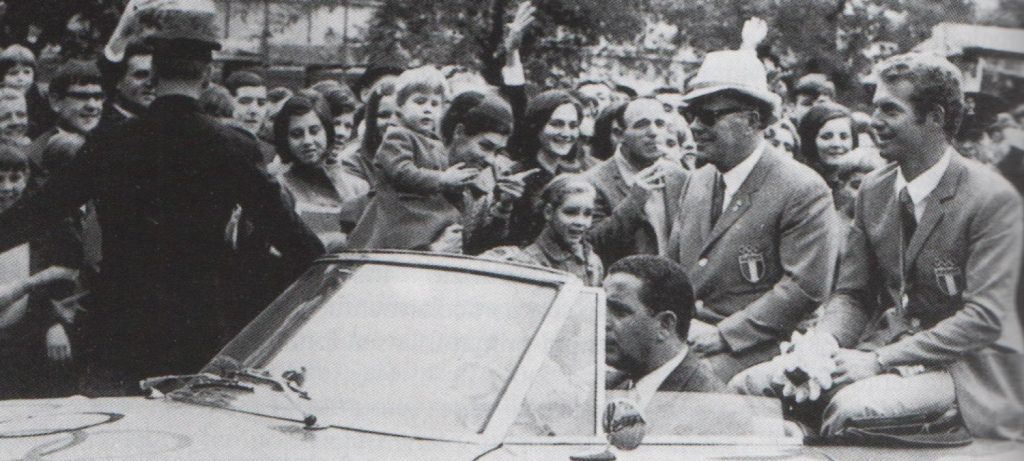
Klaus Dibiasi driving through the Bozen streets with his father Karl after his 1976 Olympic triumph
Article © of Gherardo Bonini
The author would like to express his thanks to Klaus Dibiasi for the help with this article
The following link is to the an Italian website of the Bozen swimming club that is dedicated to Karl Dibiasi
www.dibiasituffi.com/1/dibiasi_story_912188.html

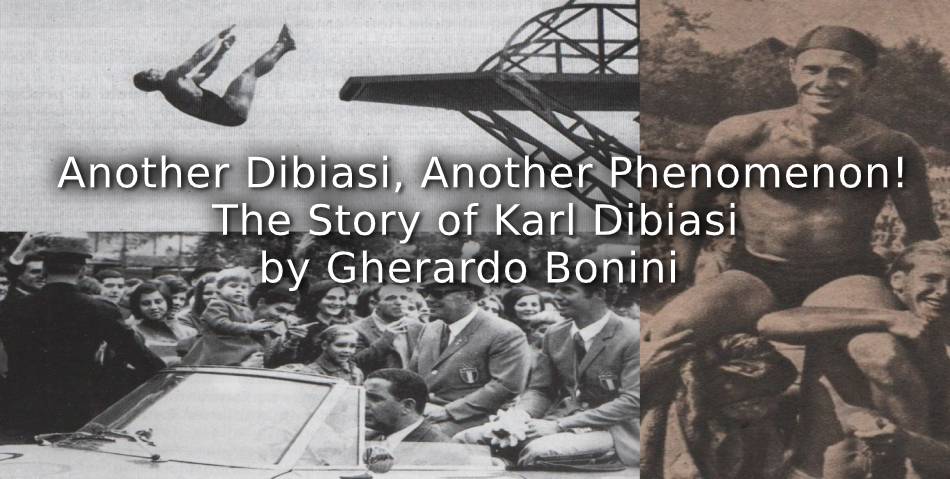
![“And then we were Boycotted”<br>New Discoveries about the Birth of Women’s Football in Italy [1933] <br> Part 9](https://www.playingpasts.co.uk/wp-content/uploads/2020/12/Boycotted-part-9-Marco-440x264.jpg)
